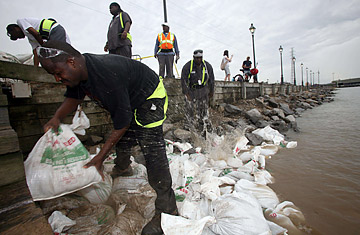
Workers from the Orleans Levee District attempt to plug leaks in the levee along the Mississippi River where it butts up against the flood walls of New Orleans' French Quarter
New Orleans is having a bad case of nerves. The Mississippi River has flooded catastrophically upstream and its swelling waters are moving inexorably down toward the Big Easy — and its traumatic memories of recent disasters, Katrina and the Gulf oil spill. "We're in a weird situation," observes Linda Jackson, an activist in the Lower Ninth Ward. Her district is particularly anxious: the neighborhood has two functioning bridges from which people can see the swelling Mississippi. The river is already at the top of many levees. The murky, dark green river is unusually choppy, causing ferries to sometimes rock uneasily. Cruise ships appear taller among this city's bundle of downtown skyscrapers. The whole thing is drawing hordes of people to the levees, prompting the authorities to close some sections. In the Uptown area, overlooking the river, a part of the levee is a bit of dirt held together by wood — and the dirt is falling in some spots.
"Anytime we see water," Mike Couste, an executive chef, said at the levee near the Audubon Zoo early Tuesday afternoon, "we get nervous." Says Jackson, the neighborhood activist: "It's only a matter of time before we flood again."
However, the official line is "Don't worry." Federal authorities predict the water will recede in the coming days, and the mayor, Mitch Landrieu, declared, "New Orleans is safe." Indeed, this city should be accustomed to the mighty Mississippi's annual rise, an event triggered by the melting of snow and ice in the river's northern stretches. This year, though, is different. By Tuesday, the river there had reached flood stage, despite moves by the U.S. Army Corps of Engineers, which manages much of America's waterways, to open two channels and divert some of the Mississippi into the Gulf of Mexico. It could take only a strong storm, or a hurricane — the season begins June 1 — to cause the water to surge. The river is like a sleeping giant you hope doesn't wake up — "a very treacherous thing," the mayor admits.
The emerging question on talk radio: Should the Mississippi River at New Orleans close? Last weekend, a set of boats struck part of a bridge crossing the Mississippi River in Baton Rouge, Louisiana's capital. Part of the flooding in the Lower Ninth Ward in the days after Hurricane Katrina was attributed to a barge breaching the levee. Ominously, on Tuesday, the authorities closed the port of Natchez, Miss., about 180 miles (290 km) northwest.
Closing river traffic at New Orleans might have a severe impact on the country's economy. Nearly a half-billion tons of industrial goods pass through the port there annually. It's estimated that some 380,000 jobs are connected, in some way, to the port. Experts believe the largely clay levees will remain in tact. "This is a pretty big flood," says John Barry, author of Rising Tide: The Great Mississippi Flood of 1927 and How It Changed America. "And yet, there have been no levee breaks."
Or as the nervous will add: not yet.
